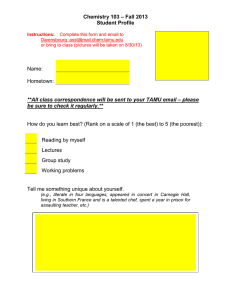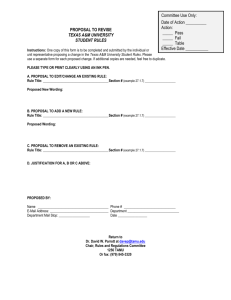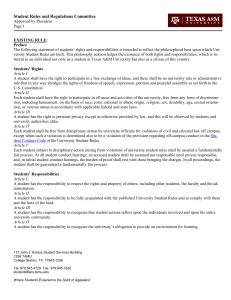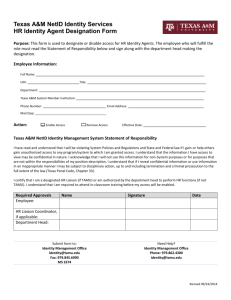Office of Graduate and Professional Studies PROPOSAL APPROVAL PAGE FOR
advertisement
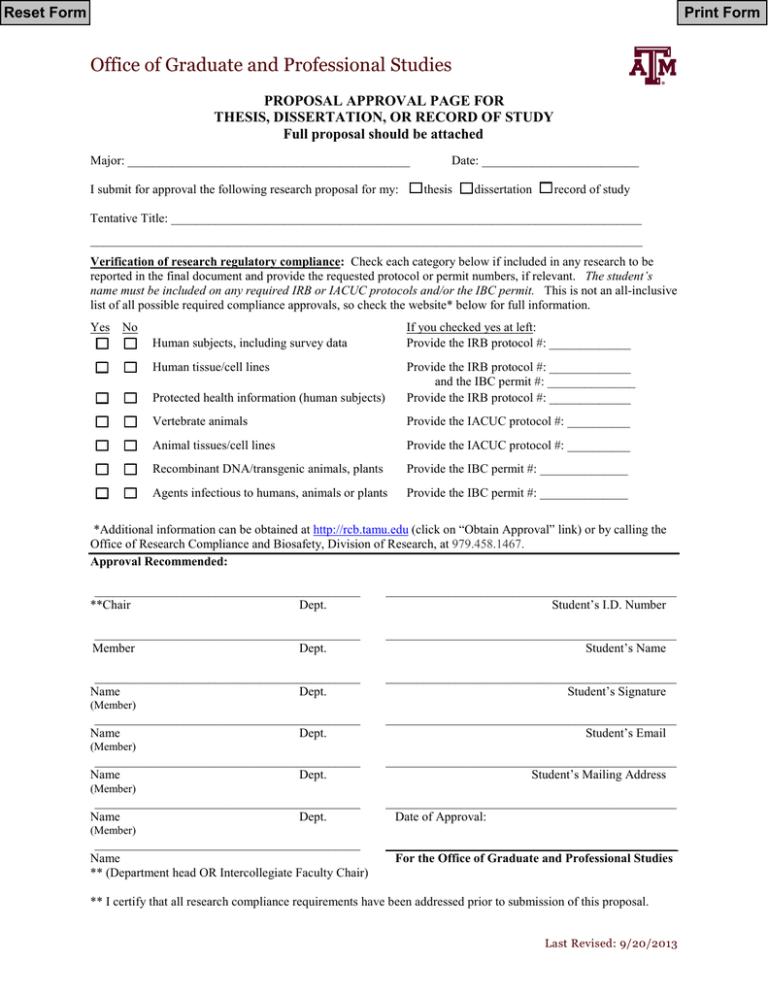
Reset Form Print Form Office of Graduate and Professional Studies PROPOSAL APPROVAL PAGE FOR THESIS, DISSERTATION, OR RECORD OF STUDY Full proposal should be attached Major: _____________________________________________ I submit for approval the following research proposal for my: Date: _________________________ thesis dissertation record of study Tentative Title: ___________________________________________________________________________ ________________________________________________________________________________________ Verification of research regulatory compliance: Check each category below if included in any research to be reported in the final document and provide the requested protocol or permit numbers, if relevant. The student’s name must be included on any required IRB or IACUC protocols and/or the IBC permit. This is not an all-inclusive list of all possible required compliance approvals, so check the website* below for full information. Yes ☐ No ☐ Human subjects, including survey data If you checked yes at left: Provide the IRB protocol #: _____________ ☐ ☐ Human tissue/cell lines ☐ ☐ Protected health information (human subjects) Provide the IRB protocol #: _____________ and the IBC permit #: ______________ Provide the IRB protocol #: _____________ ☐ ☐ Vertebrate animals Provide the IACUC protocol #: __________ ☐ ☐ Animal tissues/cell lines Provide the IACUC protocol #: __________ ☐ ☐ Recombinant DNA/transgenic animals, plants Provide the IBC permit #: ______________ ☐ ☐ Agents infectious to humans, animals or plants Provide the IBC permit #: ______________ *Additional information can be obtained at http://rcb.tamu.edu (click on “Obtain Approval” link) or by calling the Office of Research Compliance and Biosafety, Division of Research, at 979.458.1467. Approval Recommended: __________________________________________ **Chair Dept. ______________________________________________ Student’s I.D. Number __________________________________________ Dept. Member ______________________________________________ Student’s Name __________________________________________ Name Dept. ______________________________________________ Student’s Signature (Member) __________________________________________ Name Dept. ______________________________________________ Student’s Email (Member) __________________________________________ Name Dept. ______________________________________________ Student’s Mailing Address (Member) __________________________________________ Name Dept. ______________________________________________ Date of Approval: (Member) __________________________________________ Name ** (Department head OR Intercollegiate Faculty Chair) ______________________________________________ For the Office of Graduate and Professional Studies ** I certify that all research compliance requirements have been addressed prior to submission of this proposal. Last Revised: 9/20/2013 RED FLAGS: Animals Use, Human Subjects Research, Biohazards/Select Agents, Export Controls, Good Laboratory Practices Animals • http://rcb.tamu.edu/animals • 845.1828 • animalcompliance@tamu.edu vertebrate animals animal tissues or antibodies (polyclonal or monoclonal) animal cell lines genus or species euthanasia or carcasses field study or feed lot anything on the species list in iRIS Biohazards • http://rcb.tamu.edu/biohazards • 862.4549 • biosafety@tamu.edu infectious transgenic or resistant DNA or RNA biological agents (e.g. bacteria, rickettsia, fungi, viruses, protozoa, parasites, prions) that may cause disease manure culture biosafety cabinet centrifuge aerosolization recombinant plasmids human samples or specimens viral vectors also check the list of agents in iRIS Good Laboratory Practices • rcb.tamu.edu/glp • 845.1263 • glp@tamu.edu FDA or EPA product approval Product safety Biocompatibility study Pre‐clinical trial 21 CFR Part 58 (FD&CA) Food, Drug, and Cosmetics Act Division of Research Research Compliance and Biosafety 979.458.1467 phone rcb.tamu.edu Human Subjects • http://rcb.tamu.edu/humansubjects • 458.4067 • irb@tamu.edu human samples, cells, tissues research on education instructional strategies research on involving normal educational practices research involving educational tests, surveys, interviews, observation of public behavior research involving collection or study of existing data, documents, records, pathological specimens, or diagnostic specimens research and demonstration projects designed to study, evaluate, examine public benefit or service programs taste and food quality evaluation consumer acceptance studies research on drugs or medical devices collection of blood samples or biological specimens collection of data routinely employed in clinical practice x‐ray or microwave collection of data from voice, video, digital, or image recordings made for research purposes research on individual or group characteristics or behavior research on perception, cognition, motivation, identity, language, communication, cultural beliefs or practices, social behavior survey, interview, or oral history focus group program evaluation human factors evaluation quality assurance methodologies Export Controls • http://vpr.tamu.edu/resources/export‐controls • 862.6419 • exportcontrols@tamu.edu Research is intended for military or space purposes International collaboration Encryption software Use of the word(s): controlled, export controlled, classified, proprietary International travel or transfer of technology, items, chemicals, or biologicals abroad Transactions involving embargoed countries (North Korea, Iran, Sudan, Syria, and Cuba) or individuals or entities in these countries Restrictions against or approvals required for foreign national participation/access Pre‐approval rights over publications reserved by the sponsor of the research beyond that which is generally permitted 40 CFR Part 160 (FIFRA) Federal Insecticide, Fungicide, and Rodenticide Act 40 CFR Part 792 (TSCA) Toxic Substances Control Act This document provides a list of potential key words for activities that may require compliance review. This list is not intended to be exhaustive, but can be used as a compliance tool. It should not be relied upon exclusively. Questions should be directed to the appropriate research compliance and biosafety program. April 14, 2014
